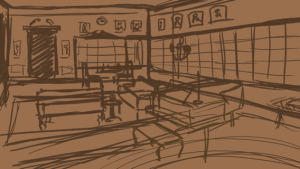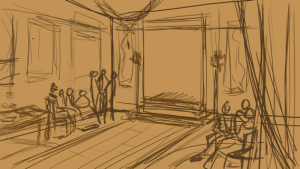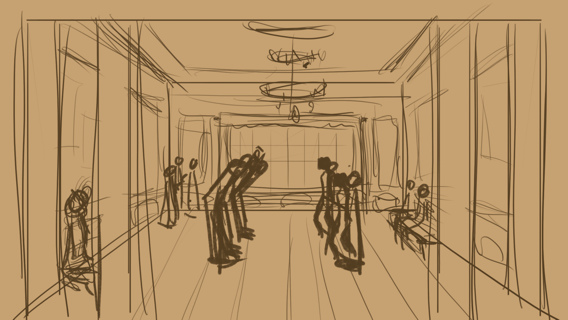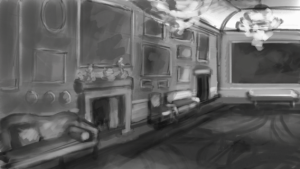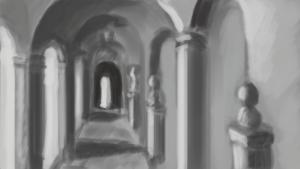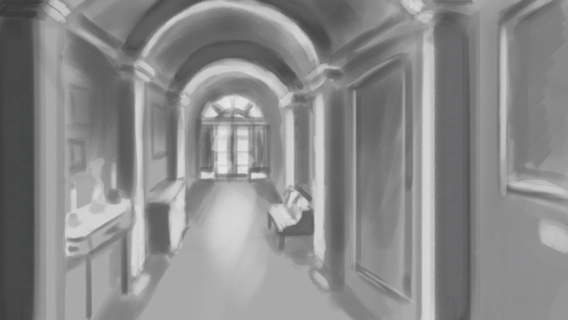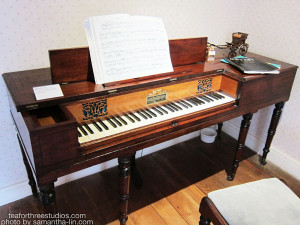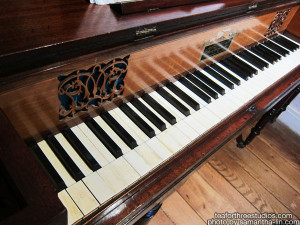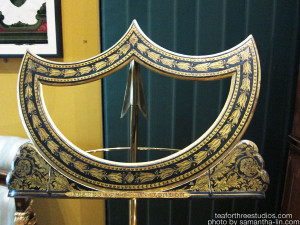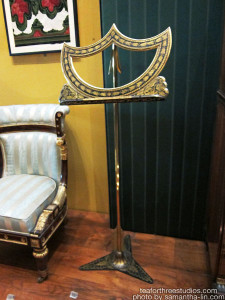On Saturday morning, when I received a few Easter-related writing prompts, I got an idea for a little Regency Love story which, when I sat down to write it on Saturday evening, became a little longer than expected. So really, this is quite a surprise gift to everyone—Jenny, Melody, and myself included! Hope you enjoy!
Tabby and the Mystery Bonnet
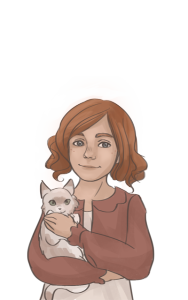
When Tabby awoke on Easter Saturday, she had a lovely, long stretch, the kind you only find on special days when there’s no work to be done, and there’s plenty of time to wake up properly. Tabby’s constant companion, Mittens, got the same idea, and gave quite an impressive yawn while she rolled onto her back and extended her paws.
Smiling to herself, Tabby put on her second favourite dress and her most comfortable pair of shoes. Before leaving her room, she smoothed down her favourite dress, hanging prettily in the wardrobe, and gave it a little pat. She would wear it tomorrow, when it was Easter Sunday, when everyone went to church in their best clothes.
Tabby closed her door softly and walked very quietly down the stairs—as quietly as Mittens, she was proud to admit—just in case Peter and Colin were still asleep. Mr Simmons had told them they could do whatever they wished on Easter Saturday, so long as they behaved themselves and were home in time for tea. Those were the precise words he’d used, and when Tabby heard the word “home”, she couldn’t help but flush happily at the thought. Yes, Lampton Hall was becoming more and more like home, and everyone in it like family. Perhaps they should all change their last names to Lampton: Peter Lampton, Colin Lampton, and Tabby Lampton. Mr Simmons could become Mr Simmons-Lampton—and at that rather silly thought, Tabby giggled to herself.
Most of the household seemed to be still asleep, so Tabby decided to go into the kitchen and help herself to a glass of water. She brightened when she saw Cook, wearing a large apron and an even larger smile.
“Good morning, Cook,” Tabby said, remembering to curtsy.
“Good morning, Tabby,” Cook said, curtsying in return.
“Meow,” Mittens said, wrinkling her nose at the dish of water that usually contained milk.
A little embarrassed by the bad behaviour, Tabby admonished her friend. “Now, Mittens, you know very well that none of us is to have milk until Lent is over. Do apologise to Cook for being so rude.”
“Meow,” Mittens said again, this time ducking her head in shame.
“Oh, you are a very good girl, dear Tabby,” Cook said. As Tabby drank her water, Cook fetched one of the boiled eggs she had been dyeing, and gave it to Tabby. “Here’s the prettiest of the lot. Take it and keep it safe, but remember not to eat it until tomorrow.”
“I promise I won’t,” Tabby said, and put the beautiful red egg into her pocket. “Thank you, Cook.”
She waited for Mittens to finish lapping her water, then picked up the bundle of fur. “Mittens and I are going for a walk now. I hope you have a good day, Cook.”
“And you too, Tabby dear.”
After she had put on her coat, Tabby opened the front door, and was excited to see it was a clear day. She didn’t like the cold very much, and the last few months had been rather dreadful. But it seemed like spring had finally shooed away the last bits of winter, and Tabby was looking forward to spending her day exploring and playing in the sunshine.
But when she walked out the door, Tabby tripped and almost fell. Startled, she caught her balance, looked down, and was surprised to find a bonnet lying on the steps. She picked it up rather carefully, brushing away a spot of dirt, and stroke her fingers against the bright yellow ribbon.
“What a pretty bonnet,” she said to herself, then showed it to Mittens, who was nudging her leg in concern. “Thank you, Mittens—I’m quite all right. And look at what I found. It’s very pretty, isn’t it?”
“Meow,” agreed Mittens.
“But what do you think a pretty bonnet is doing out here by itself? I don’t think I’ve seen it before, though I’m not very good at remembering bonnets. I shall remember this one from now on—it has such a lovely yellow ribbon.”
“Meow,” asked Mittens.
“Oh, I don’t know… Perhaps one of Mr Simmons’ friends left it yesterday when they came to visit? I think I heard some voices, but I can’t quite say whose. Do you think we should go and look for its owner?”
No longer quite so interested in the conversation, Mittens stretched her long, white neck, and sniffed the pocket where Tabby had kept her egg.
“Oh! Tomorrow’s Easter Sunday, and the lady who owns this would be very sorry to go to church without her pretty bonnet! We must go and find her!”
Without waiting for a reply, Tabby gathered Mittens under one arm, and held the bonnet in her spare hand. She started making her way into town, determined now to find the owner. There were a few houses between Lampton Hall and Darlington, and Tabby would try them all.
Her first stop was at the little cottage where Miss Woods lived with her brother. Tabby always thought Miss Woods a very pretty lady, and she was almost certain the bonnet belonged to her.
“Can I help you?” Mr Woods asked when he opened the door.
“Good morning Mr Woods, I found this bonnet right outside Lampton Hall, and I thought it might belong to Miss Woods.”
Mr Woods looked a little puzzled, then turned his head and called inside. “Caroline? Have you lost a bonnet?”
A moment later, Miss Woods joined her brother. But after Tabby had repeated her speech, Miss Woods simply shook her head.
“You are very kind to ask, but that bonnet is not mine.”
“Oh…” Tabby was a little disappointed, but she quickly remembered her manners, and gave a little curtsy. “Thank you for your time, Miss Woods. I’m sorry to have troubled you on such a day.”
Miss Woods smiled in response. “It’s no trouble at all. I think it admirable of you to look for the bonnet’s rightful owner when you could be playing instead.”
“But you see, tomorrow’s Easter Sunday, and I’ll be wearing my favourite dress to church. I’d be quite sorry if I’d lost my dress and had to wear my second favourite, and I don’t want anyone to be sorry they can’t wear their favourite bonnet.”
“Then you are on a very important mission, Miss Tabby.”
Miss Woods then had an idea, and asked her unexpected visitor to wait for a moment. When she returned, she held out a yellow egg.
“I know it’s a little early, but here’s a yellow egg to match the yellow ribbon on your mystery bonnet. Now, remember not to eat it until tomorrow.”
“I promise I won’t,” Tabby said, and put the beautiful yellow egg into her pocket, next to the red egg Cook had given her. “Thank you, Miss Woods.”
Encouraged by Miss Wood’s kindness, Tabby set out again, even more determined to find the bonnet’s owner.
Her next stop was the tidy cottage where Mrs Norris lived. Tabby knew Mrs Norris was old and wise, and would look quite stately in the bonnet.
“Why, Miss Tabitha, when I got up this morning, I certainly hadn’t expected to find you at my front door!”
“Good morning Mrs Norris, I found this bonnet right outside Lampton Hall, and I thought it might belong to you.”
“Oh no, I can assure that isn’t mine—it is rather pretty, but I’ve no need for such things. The bonnet I have does its job well enough.”
Tabby nodded, and gave another little curtsy. “Thank you for your time, Mrs Norris. I’m sorry to have troubled you on such a day, but you see, I wanted to find the bonnet’s owner before church tomorrow, in case she had planned to wear it, only to find it missing.”
“Well, that is very kind of you.”
Mrs Norris then thought quite hard for a moment.
“Now I don’t usually like to break the rules,” she finally said, “but I think you deserve a reward for being so virtuous. If I gave you an egg today, would you promise not to eat it until Easter?”
Tabby put down Mittens for moment to fetch the two eggs from her pocket. They were rather big, and filled her small hands.
“I’ve been given two eggs already,” she explained, holding them out. “I promised both Cook and Miss Woods I won’t eat them until tomorrow. And I haven’t had anything I shouldn’t all Lent and Holy Week, either—I’ve even made sure Mittens gets water instead of milk.”
“You’ve not broken your fast, and you’ve received an egg from Miss Woods? Well then, I trust you will keep your promise.”
Mrs Norris disappeared inside, and returned with brown egg. “Here’s another one. I want you to show it to me at church tomorrow—it’s not that I don’t believe you, you see, but because I want to be absolutely certain you’ve not broken your word to the good Lord.”
“I shall bring all my eggs tomorrow,” Tabby said, putting away all three eggs into her pocket, which was becoming quite heavy. “Thank you, Mrs Norris.”
With both Mittens and her mystery bonnet in hand, Tabby continued on her search.
Her next stop was the manor where Mr and Mrs Chapple lived. Mr Chapple was often visiting various towns to get new books for his circulating library, but Mrs Chapple always remained in Darlington. Tabby hadn’t paid attention to what Mrs Chapple wore, but no lady would go to church without a bonnet, and Mrs Chapple was no exception.
“Hello, Tabby, have you come to borrow another book?” Mrs Chapple said when she opened the door.
“Good morning Mrs Chapple, I’m still reading the last one, thank you. But I found this bonnet right outside Lampton Hall, and I thought it might belong to you.”
“I’m afraid it doesn’t—yellow isn’t quite my colour.”
“Oh, I hadn’t noticed before, but I shall remember that now.” Tabby curtsied, trying not to wobble when the eggs in her pocket moved about. “Thank you for your time, Mrs Chapple, and I’m sorry to have troubled you on such a day.”
“I see you’ve been collecting eggs,” Mrs Chapple said, having spotted the slight bulge in Tabby’s dress. “I’d love to make a contribution.”
Mrs Chapple returned a while later with a green egg. “Here you go. I’ve been dyeing these in periwinkle leaves—green is most definitely my colour.”
“I shall remember that,” Tabby said, and put the beautiful green egg into her pocket with the red egg from Cook, the yellow egg from Miss Woods, and the brown egg from Mrs Norris. “I promise I won’t eat it until Easter. Thank you, Mrs Chapple.”
And Tabby set off again, the eggs jiggling away in her pocket.
Soon, she, Mittens, and the mystery bonnet reach the town centre. All the shops would be closed today, but Tabby knew most of the shopkeepers lived above their shops. She decided to try Mr Stevens’ bakery first.
“Now who do we have here?” Mrs Stevens asked, her youngest son peering curiously from behind her. “Miss Tabby, is it?”
“Yes, Mrs Stevens, I found this bonnet right outside Lampton Hall, and I thought it might belong to you.”
“It does bear a remarkable resemblance to one of my bonnets, except mine is quite covered in flour. I’m sorry I can’t be of any help.”
Tabby curtsied, this time ready for the extra weight that had caused the embarrassing wobble in front of Mrs Chapple.
“Thank you for your time, Mrs Stevens, and I’m sorry to have troubled you on such a day.”
Tabby was halfway to her next destination when she heard someone calling her name. She turned around to see Mrs Stevens’ youngest son running towards her.
“Mama told me to give you this,” he said, holding out a pink egg in his rather small hands. “And she told you not to eat it until Easter.”
“Tell her I promise I won’t,” Tabby said, and put the beautiful pink egg into her pocket along with the others. “And I hope you won’t be eating any until tomorrow, either.”
“I promise I won’t,” the boy echoed, and ran back to the bakery.
“Well, Mittens,” Tabby said when the street was empty once more, “we’ve been given five eggs for tomorrow, but we’ve still not found the owner of this pretty bonnet!”
A little discouraged, but still quite determined, Tabby set off again. She still had several more ladies to visit, and surely, one of them had to be missing a bonnet.
But it was not so. Mrs Murray had been ill and hadn’t left the house in a week, though she would be at church tomorrow; Mrs Mortimer had all her bonnets accounted for, though she did recognise the ribbon as one from her haberdashery; Mrs Taylor and her two daughters admired the bonnet so much they asked Mr Taylor right there and then if they could procure similar ones, to which Mr Taylor responded by saying he spent too much time cobbling to notice anything above the ankles. But everyone gave her an egg, all of a different colour, until Tabby could barely walk without fear of the eggs cracking against one another.
Disheartened, Tabby wobbled towards the Town Hall, and sat on its steps. Mittens jumped out of her arms, and meowed at her in concern.
“Oh, Mittens, it is almost time for tea, and I’ve not yet found the owner of this very pretty bonnet!”
Poor Tabby was close to tears, but then she heard the sound of horses and wheels. Swallowing away her self-pity, Tabby rose to her feet, just when the open carriage stopped in front of her. Tabby recognised the lady as Miss Ashcroft, who was looking at her in concern.
“Miss Tabby? Are you quite all right?”
Tabby gave Miss Ashcroft her bravest smile and her best curtsy, though both were rather difficult tasks.
“Yes, thank you, Miss Ashcroft.” She held up the bonnet. “I found this right outside Lampton Hall. Is it yours?”
“Oh, dear Tabby, I’m sorry to say it’s not. Have you been searching for its owner all day?”
Tabby nodded.
“Goodness me, you must be rather exhausted from your adventure!”
It took some more courage to shake her head, but Tabby did it quite firmly.
“I do like walking and exploring, and I think Mittens likes it too. Everyone has been very kind to me, and they all gave me an egg, though they told me not to eat them until tomorrow—which I won’t, I promise. I would very much like to show you all my eggs, but I’m afraid I’ll drop them if I try to take them out of my pocket all at once.”
Miss Ashcroft looked quite astonished at this, and a little bit in awe. But just like a true lady, she recovered very quickly.
“I’m afraid I don’t have any eggs to give you,” she said, “but I do have something that might help.”
She reached beside her, and produced a woven basket. “I was taking a few of these around today, and happen to have an empty basket left over. Perhaps you could put your eggs in them.”
Tabby brightened at the thought. “Oh, that would be very useful. I wasn’t sure how to go home without accidentally cracking the eggs, but a basket would do the trick. Thank you, Miss Ashcroft.”
“Oh, no, you mustn’t walk all the way home when you’re already so tired! Why don’t you ride with me?”
Tabby shook her head again, this time with more conviction. “You’ve offered to lend me your basket, which would be very helpful. I don’t want to be a bother.”
“It’s no bother at all,” Miss Ashcroft insisted. “Besides, I would be sick with worry at the thought of you walking home by yourself after the day you’ve had.”
“Oh…”
Tabby didn’t know Miss Ashcroft very well, but she liked her very much already, and didn’t want to make anybody sick with worry.
“You are very kind, and I don’t want to make you sick with worry,” she said, and gathered Mittens in her arms again. “I would like to ride with you back to Lampton Hall.”
Miss Ashcroft helped Tabby onto the carriage, while the eggs in Tabby’s pocket bounced around alarmingly. As soon as she was seated, Miss Ashcroft presented the basket, and Tabby began to withdraw the eggs one by one, placing them carefully in the basket.
“A blue egg from Miss Taylor, a golden egg from Mrs Mortimer, a black egg from Mrs Murray, a pink egg from Mrs Stevens, a green egg from Mrs Chapple, a brown egg from Mrs Norris, a yellow egg from Miss Woods, and a red egg from Cook. That’s all of them.”
Miss Ashcroft admired them, and said, “What a pretty sight!”
Mittens admired them too, and decided to step gently into the basket and curl herself against the eggs rather protectively.
“Why, you could mistake her for the Easter Hare!” declared Miss Ashcroft, and they both giggled together.
When everyone was settled, Miss Ashcroft asked the coachman to head to Lampton Hall. The ride was a little bumpy, but Mittens made sure the eggs came to no harm, while Tabby recounted everything that had happened.
Soon, they had reached Lampton Hall, and Tabby was glad for the short journey. She carefully climbed out of the carriage, then took the basket and the bonnet.
“Thank you for being so kind, Miss Ashcroft. Riding is much less tiring than walking, though I can’t imagine myself giving up walking.”
“You’re most welcome, dear Tabby. Thank you for sharing your stories with me. I hope you’ll find the bonnet’s rightful owner soon.”
Before she rode off, Miss Ashcroft added, rather shyly, “Oh, and it would please me greatly if you might call me ‘Ellie’, as all my friends do.”
Flushing with delight, Tabby nodded, and gave her very, very best curtsy. “I will, Ellie. Thank you, and goodbye!”
She waited until her new friend’s carriage had passed out of sight before returning to the house. Mittens seemed quite happy to be home, and left the basket to go greet everybody.
“Well,” Tabby said to the bonnet as she stood on her toes to set it on a hook, “I tried very hard today to find your owner. I shall try even harder tomorrow.”
Taking off her coat, Tabby heard her stomach give a little rumble. Dinner would be served soon, and she couldn’t wait to show her beautiful eggs and basket to Peter and Colin. She would’ve liked to show them to Mr Simmons too, but he had gone to join all the grown-ups at the Easter Vigil.
Later that night, when she was tucked in bed and her basket of eggs was being carefully guarded by Mittens, Tabby lay awake until she heard Mr Simmons’ return. She also heard a lady’s voice, but Tabby was too tired to think anything of it. Knowing Mr Simmons was safely home, Tabby finally fell asleep.

She greeted Peter and Colin bright and early the next morning, and complimented them on their lovely clothes. Even Colin, who was always losing his shoes, looked quite proper. In turn, the boys remarked on Tabby’s favourite dress, and she smiled and thanked them, feeling very pleased.
“Happy Easter,” Mr Simmons said when he saw them. “You all look marvellous today.”
“As do you,” Peter said, and it was true: Mr Simmons had a certain shine about his eyes that wouldn’t stay hidden behind his spectacles. Tabby didn’t think she had seen him so happy before.
“Are we all ready to head to church?” Mr Simmons asked.
Tabby had brought her basket with her, and showed it to Mr Simmons. “Might I bring these with me? Yesterday, I was trying to find the owner of a pretty bonnet. I couldn’t find her, but everyone gave me an egg. They all made me promise not to eat them until Easter, and Mrs Norris asked me to show the one she gave me so she could be sure I had kept my promise.”
Mr Simmons was a little taken aback after this speech. “A bonnet? Did it have a yellow ribbon?”
“Yes, and a very pretty one at that!” Excited by the discovery of Mr Simmons’ knowledge, Tabby had raised her voice, but now remembered her manners again. “Do you know its owner? Have you found her?”
“Oh yes, but I daresay it was the owner who found the bonnet. She’d accidentally left it on Good Friday, and came to retrieve it last night.”
Before Tabby could uncover any more of this mystery, Mr Simmons began ushering them out the door.
“We must leave now, for we mustn’t be late. And yes, Tabby, you may bring your basket, and Mitten too, though both she and the basket would have to stay outside during the service. Those eggs are quite beautiful, and I’d like to hear all about them later.”
Delighted by the turn of events, Tabby did as she was told, making sure she put on her coat carefully in case she ruined her favourite dress. For this special occasion, Mr Simmons had asked Mr Curtis to take them all to church in a large coach. Tabby smiled when she saw Mr Curtis waiting for them patiently outside, and made sure she curtsied very well.
“Happy Easter, Mr Curtis. Thank you for lending us your coach—I do like walking, but I might’ve ruined my favourite dress on the way, and I would be quite sorry to go to church in a ruined dress.”
Mr Curtis gave her the small, special smile he kept for people he liked. “Indeed, that would be a sorry sight. And my, what colourful eggs. Did you dye them with Cook and your friends?”
“No, I was given them yesterday when I tried to find the owner of a very pretty bonnet. Would you like to hear about it, Mr Curtis?”
“Oh yes, do please tell me all about it on our journey to church.”
He held the basket for Tabby while she climbed into the coach. When everyone had secured a seat and the coach began to move, Tabby turned to Mr Curtis, and talked about her adventures.
Shortly after, they arrived at the parish, stepping out of the coach one by one, with Mr Curtis helping Tabby again with the basket. Tabby was relieved to find they were just in time to join everyone else, who were slowly filing into the church. Remembering what Mr Simmons had said earlier, she excused herself to find a suitable place to leave her basket and kitten.
Spotting a nice patch of grass under the shade of an ash tree, Tabby walked towards it and carefully set down both Mittens and the basket of eggs.
“I’ll be going inside for a while, but you must stay here and protect the eggs from any naughty birds. I’ve put the basket in the shade so they won’t spoil, but you can lie in the sun if you want.”
Mittens considered her words, but decided to curl up against the eggs instead.
“Yes, thank you—that would do perfectly well, too. I’ll see you very soon, my dear Mittens.”
As she rose to her feet, Tabby caught sight of something very familiar. It was her mystery bonnet, pretty yellow ribbon and all, being worn by its rightful owner! She took a moment to marvel at how the ribbon shone elegantly under the sun, before directing her attention to the lady who wore it.
There, wearing a lovely yellow dress to match the pretty bonnet and radiating with joy, was Miss Mary Earlwood.
Tabby beamed, and turned around to address Mittens one last time. “I knew it was someone’s favourite bonnet! And Miss Ashcroft—Ellie—was right: you do look like a curious Easter Hare with all your beautiful eggs.”
Then she went to join all her friends and family to celebrate the wonders of Eastertide.

Story by Samantha Lin and art by Jenny Tan. © Tea For Three Studios 2015. All rights reserved. Please do not reproduce without permission.

